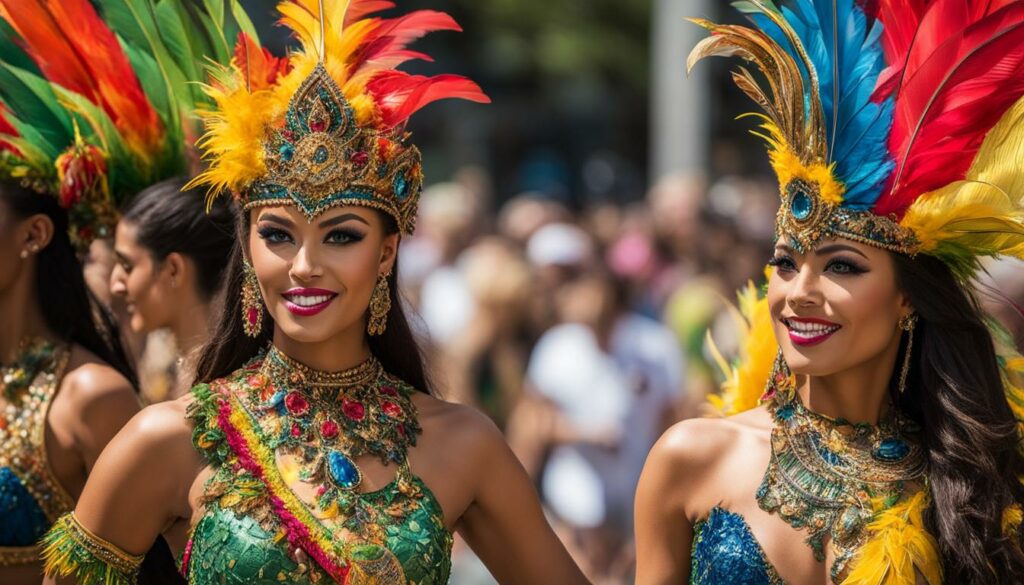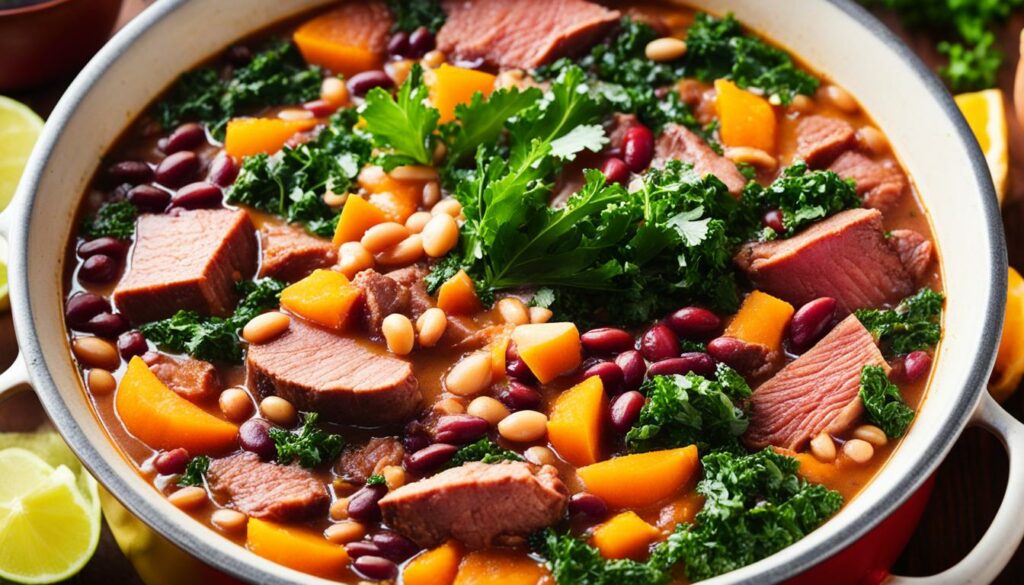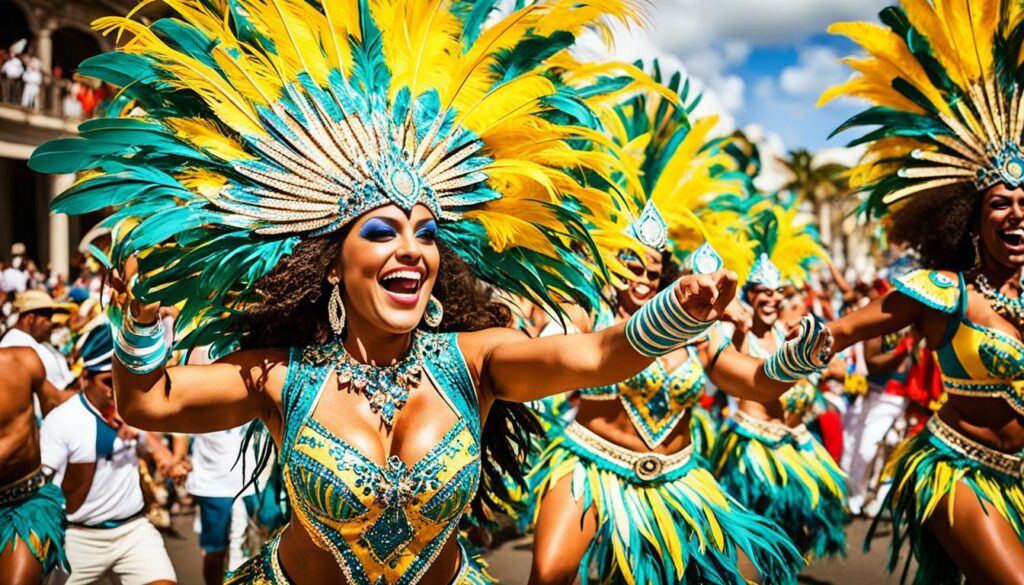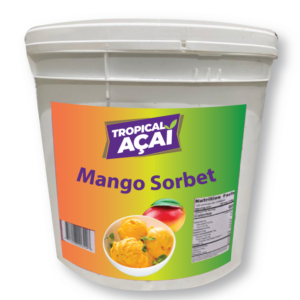Welcome to the vibrant and exhilarating world of Brazil Carnival! Get ready to immerse yourself in a mesmerizing spectacle of colors, music, and dance as we take you on a journey through this iconic celebration. From the magnificent Rio de Janeiro Carnival to the energetic Samba parade and dazzling Carnival costumes, there is so much to discover and experience. But have you ever wondered about the origins of Brazilian Carnival and its significance? Join us as we uncover the rich history and traditions behind this extraordinary cultural extravaganza. Get ready to be captivated by the mesmerizing rhythms of samba music and the creative brilliance of the Carnival costumes. Delve into the heart of Brazilian culture and let the magic of Carnival transport you to a world of joy and excitement.
Key Takeaways:
- Brazil Carnival is one of the largest cultural celebrations in the world.
- Rio de Janeiro is a renowned location for Carnival, famous for its Samba parade.
- Carnival costumes are elaborate and visually stunning.
- The origins of Brazilian Carnival can be traced back to Portuguese settlers.
- Carnival is a celebration of Brazilian culture, music, and dance.
The History and Significance of Brazilian Carnival
Brazilian Carnival has a rich history and holds significant cultural importance in Brazil. Its roots can be traced back to ancient Roman Catholic traditions and serve as a farewell to meat before the fasting period of Lent. The Portuguese colonizers brought their own carnival traditions to Brazil, which were further influenced by the African culture of enslaved people. Over time, Brazilian Carnival developed into a unique celebration that artfully blends elements of European and African cultures.
The festival of Brazilian Carnival is a true reflection and celebration of Brazilian culture. It unites people from all walks of life, bringing them together to dance, sing, and showcase their creativity through elaborate costumes and parades. At the heart of Brazilian Carnival is the captivating rhythm of Samba music, with its infectious beats, vibrant melodies, and energetic dance moves. Samba music has become the soundtrack of Carnival, encapsulating the essence of the festival and driving the festivities forward.
“Brazilian Carnival is a celebration of our diverse heritage, where we embrace the vibrant spirit of our culture through music, dance, costumes, and parades.”
In Brazilian Carnival, different regions of the country showcase their unique styles and traditions. From the famous Samba Parade in Rio de Janeiro to the lively street parties in other cities, each celebration adds its own flair to the festival. The Carnival parade, in particular, is a highlight of the festivities, featuring vibrant costumes, stunning floats, and meticulously choreographed performances by samba schools. This parade is a true spectacle, showcasing the craftsmanship and creativity of the participants.
Overall, Brazilian Carnival holds immense cultural significance as it allows Brazilians to express their identity, creativity, and unity. It is a time for joyful celebration, where the spirit of Brazilian culture shines brightly. Through its music, costumes, and parades, Brazilian Carnival captivates the world, inviting everyone to immerse themselves in the vibrant and lively atmosphere of this extraordinary cultural event.
| Key Elements of Brazilian Carnival | Significance |
|---|---|
| Samba Music | The rhythmic beats and energetic melodies of Samba music form thesoul of Brazilian Carnival, creating an immersive and joyful experience. |
| Elaborate Costumes | The intricate and vibrant costumes worn during Carnival allow participants to express their creativity and showcase the artistry of Brazilian fashion. |
| Parades | The Carnival parades, such as the Samba Parade in Rio de Janeiro, bring together samba schools to showcase their talent, choreography, and stunning visuals. |
| Unity and Diversity | Brazilian Carnival celebrates the multicultural heritage of Brazil, bringing people from all backgrounds together in a spirit of unity and joy. |
Carnival Celebrations Across Brazil
Carnival is a vibrant and diverse celebration that takes place in various cities across Brazil, each with its own unique traditions and styles. From the lively streets of Salvador, Bahia to the iconic Sambadrome de Marques de Sapucai in Rio de Janeiro, Carnival immerses visitors in a whirlwind of music, dance, and cultural heritage.
Bahia Carnival: Embracing African Roots
In Salvador, Bahia, Carnival is a true reflection of Brazil’s African heritage. The celebration is known for its energetic Axé music, played by bands on trio elétrico trucks, as people joyfully follow along in the streets. The rhythmic beats and vibrant melodies of Axé music create an electrifying atmosphere, inviting everyone to join in the festivities.
Bahia Carnival pays homage to its African roots through samba-reggae and axé rhythms. Samba-reggae is a fusion of Afro-Brazilian samba percussion with Jamaican reggae influences, creating a unique and infectious sound. The vibrant and colorful costumes worn during Bahia Carnival reflect the diversity of African culture, with intricate designs and bold patterns.
Sambadrome de Marques de Sapucai: The Epicenter of Carnival
Rio de Janeiro is internationally renowned for its Carnival celebrations, with the focal point being the Sambadrome de Marques de Sapucai. This iconic venue hosts the Carnival parade, where samba schools from all over the city compete for the title of the best parade.
The Carnival parade at Sambadrome de Marques de Sapucai is a dazzling spectacle of creativity and craftsmanship. Each samba school tells a unique story through their elaborate costumes, floats, and choreographed performances. The themes of the parade often touch upon Brazilian history, social issues, and the environment, creating a captivating narrative that captivates both participants and spectators.
“The Sambadrome de Marques de Sapucai is a testament to the passion and dedication of the samba schools and the vibrant spirit of Brazilian Carnival.”
– Maria Santos, Samba Enthusiast
Attending the Carnival parade at Sambadrome de Marques de Sapucai offers an unforgettable experience, filled with music, dance, and the infectious energy of Carnival. It is a celebration of Brazilian culture and a testament to the country’s love for samba music and artistic expression.
Carnival Traditions: A Rich Tapestry of Culture
Throughout Brazil, Carnival is a time to embrace traditions that have been passed down through generations. From the colorful costumes to the lively music, every aspect of Carnival reflects the diverse cultural heritage of Brazil.
The vibrant street parties, known as blocos, bring communities together to dance, sing, and celebrate. People of all ages join in the festivities, wearing costumes, and immersing themselves in the joyous atmosphere. The sounds of drums and other percussion instruments fill the air as samba music permeates every corner of the cities.
Carnival is a celebration of unity, diversity, and the sheer exuberance of life. It is a time when Brazilians come together to express their creativity, passion, and love for their country’s rich cultural traditions.
In this section, we explore the diverse Carnival celebrations across Brazil, from the energy of Bahia Carnival with its African roots to the iconic Sambadrome de Marques de Sapucai in Rio de Janeiro. The vibrant street parties, traditional music, and colorful costumes make Carnival a unique and unforgettable experience. Join us as we dive into the rich tapestry of Carnival traditions in different cities across Brazil.
“Carnival is a celebration that brings us together, where we can let loose, express our creativity, and honor our cultural heritage.”
– Gabriela Silva, Carnival Enthusiast
Carnival Costumes and Attire
Carnival costumes are a central aspect of the celebration, with participants spending months crafting elaborate outfits. Carnival costumes are a unique expression of Brazilian culture and a celebration of the vibrant spirit of Samba music.
These costumes are inspired by a wide range of themes, allowing individuals to embody various aspects of Brazilian culture such as nature, history, and politics. The creativity and artistry involved in designing these costumes are truly awe-inspiring.
Featuring vibrant colors, intricate details, and eye-catching embellishments, Carnival costumes captivate the senses and reflect the joyous energy of the festival. Sequins, feathers, and beads are used to heighten the visual impact, creating dazzling and breathtaking ensembles.

“Carnival is a time of self-expression and creativity, where people are encouraged to embrace their individuality and showcase their passion for Brazilian culture and Samba music through their costumes.”
During street parties and parade processions, attendees adorn themselves with vibrant neon colors, body glitter, face paint, and accessories to add to the festive atmosphere. The streets come alive with a riot of colors and a symphony of rhythms, as the costumes and attire contribute to the overall exuberance of the celebration.
With each costume uniquely crafted and thoughtfully designed, it is evident that Carnival costumes play a significant role in the celebration, allowing participants to proudly display their cultural identity and artistic talents.
As Brazilian culture and Samba music intertwine, Carnival costumes represent the fusion of these elements into stunning visual spectacles. They epitomize the vibrancy, diversity, and sheer joy of Brazilian Carnival.
| Key Features of Carnival Costumes | Value |
|---|---|
| Vibrant colors | 🌈 |
| Elaborate details | 🔥 |
| Eye-catching embellishments | ✨ |
| Creativity and self-expression | 🎨 |
Carnival Foods and Traditions
Feijoada is a traditional Brazilian dish that is commonly enjoyed during Carnival, particularly on Saturdays. It is a black bean stew made with pork meat and often served with rice, farofa (toasted cassava flour), and collard greens. Feijoada has its origins in the slave population in Brazil, as it was created using leftovers and inexpensive ingredients. Despite its humble beginnings, feijoada has become a beloved and hearty stew that is synonymous with Carnival celebrations. It reflects the multicultural influences of Brazilian cuisine and adds to the festive atmosphere of the festival.
Feijoada, a flavorful and satisfying black bean stew, is a must-try dish during Carnival in Brazil. Made with pork meat and served with rice, farofa, and collard greens, this traditional Brazilian delicacy showcases the rich and diverse culinary heritage of the country. Originating from the resourcefulness of the slave population in Brazil, feijoada embodies the spirit of Carnival by transforming humble ingredients into a mouthwatering feast.
The rich and savory flavors of feijoada symbolize the blending of cultures that is so integral to Brazilian cuisine. The dish reflects the influence of African, Portuguese, and indigenous culinary traditions, resulting in a truly unique and delicious eating experience. With its hearty nature and comforting taste, feijoada provides sustenance and energy for the festive celebrations of Carnival.
Feijoada is often enjoyed on Saturdays during Carnival, as it is the perfect meal to fuel the day’s festivities. Whether you are participating in a vibrant street parade or immersing yourself in the lively atmosphere of a Carnival party, feijoada offers a filling and satisfying option to keep you going. The combination of the rich, meaty stew and the accompaniments of rice, farofa, and collard greens creates a balanced and flavorsome meal that is sure to delight.

Feijoada Recipe:
If you want to experience the authentic taste of Brazil and recreate the flavors of Carnival in your own kitchen, here is a simple feijoada recipe to try:
- Ingredients:
- 1 pound of black beans
- 1 pound of pork shoulder or spare ribs
- 1 smoked sausage (linguiça or chorizo)
- 1 onion, chopped
- 4 cloves of garlic, minced
- 2 bay leaves
- Salt and pepper to taste
- Soak the black beans in water overnight. Drain and rinse before cooking.
- In a large pot, sauté the chopped onion and minced garlic until fragrant.
- Add the pork shoulder or spare ribs and cook until browned.
- Add the soaked black beans, smoked sausage, bay leaves, salt, and pepper.
- Cover the pot with water and bring to a boil. Reduce heat and let it simmer for about 2 to 3 hours, or until the beans are tender and the meat is falling off the bone.
- Remove the bay leaves and discard.
- Serve the feijoada hot with rice, farofa, and collard greens.
Enjoy this authentic taste of Brazil and immerse yourself in the vibrant flavors and traditions of Carnival.
Conclusion
Brazilian Carnival is a mesmerizing celebration that encapsulates the vibrant traditions and rich cultural heritage of Brazil. It brings together people from all walks of life to partake in the exuberance of samba music, elaborate costumes, and lively dance performances. The festivities showcase the unique fusion of European, African, and indigenous influences that have shaped Brazilian culture.
Whether you choose to witness the grandeur of the Samba Parade in Rio de Janeiro or immerse yourself in the street parties across various cities, Brazilian Carnival promises an unforgettable experience. The energy and enthusiasm that radiate during Carnival are contagious, filling the air with joy and excitement.
Through Carnival, Brazilians proudly celebrate their cultural diversity by embracing their traditions and expressing their creativity. The colorful and intricate costumes displayed during the festivities reflect the immense talent and craftsmanship of the people. The rhythmic beats of samba music, with its infectious energy, serve as the backdrop for the mesmerizing performances that captivate spectators.
As you revel in the Carnival traditions, you become a part of a collective celebration that transcends borders, fostering a sense of unity. It is a time to connect with others, to appreciate the beauty of Brazilian culture, and to embrace the joy that emanates from every aspect of this extraordinary celebration. Brazilian Carnival is an invitation to experience the vibrancy and richness of a nation, and to witness the unyielding spirit of its people.
FAQ
What is Brazilian Carnival?
Brazilian Carnival is one of the largest cultural celebrations in the world, known for its vibrant costumes, energetic music, and lively parades. It is a festival that embraces Brazilian music, dance, and culture.
What is the history behind Brazilian Carnival?
The origins of Brazilian Carnival can be traced back to Portuguese settlers who brought the tradition of carnivals to Brazil. Over time, it was influenced by African culture and evolved into a unique celebration that combines elements of European and African cultures.
Where is the most famous location for Carnival in Brazil?
The most famous location for Carnival in Brazil is Rio de Janeiro, where the highlight of the celebration is the Samba Parade in the Sambadrome de Marques de Sapucai.
What are some other Carnival celebrations across Brazil?
Other Carnival celebrations include Bahia Carnival in Salvador, known for its Axé music and trio elétrico trucks, which pay homage to the African roots of Brazilian culture.
What is the significance of costumes in Brazilian Carnival?
Costumes are a central aspect of Brazilian Carnival, with participants spending months crafting elaborate outfits. They showcase creativity and are inspired by various themes, allowing people to embrace the spirit of Brazilian culture and samba music.
What traditional dish is commonly enjoyed during Carnival in Brazil?
Feijoada, a black bean stew made with pork meat, is commonly enjoyed during Carnival. It reflects the multicultural influences of Brazilian cuisine and adds to the festive atmosphere of the festival.






